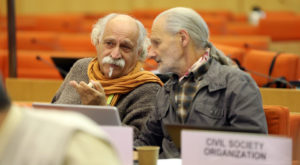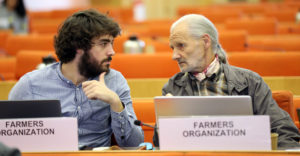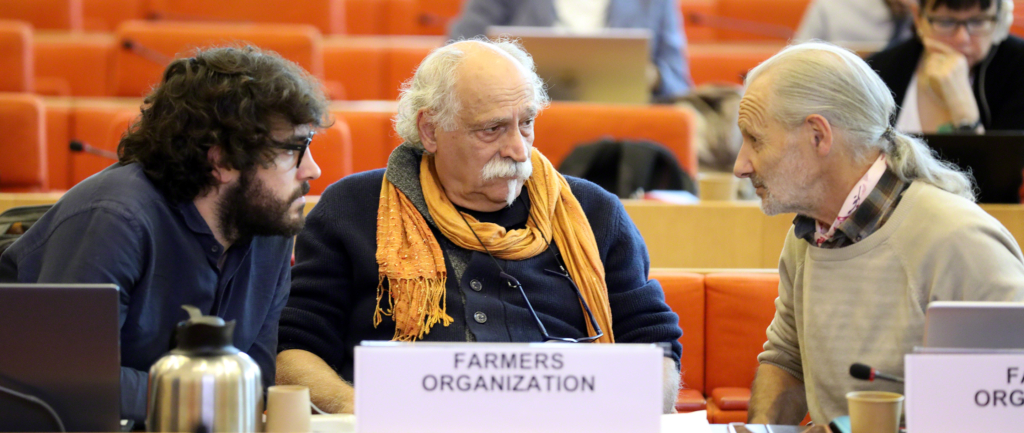November 5, 2019
Picture by IISD/ENB | Mike Muzurakis Report of the International Planning Committee for Food Sovereignty on the continued Open Ended Working Group on the Multilateral System of the International Treaty on Plant Genetic Resources for Food and Agriculture Participants for the IPC: Guy Kastler (representative for farmers’ organizations), Antonio Onorati (as Rome-based) and Stefano Mori (as facilitator of the IPC Working Group). Between 24 and 26 October 2019, the representatives from Contracting Parties, farmers’ organizations, seeds industries and civil society organizations gathered again to finalise the drafting of a compromise proposal initiated at the ninth meeting of this working group held last June in Rome.. When we refer to the Multilateral System, we refer to the articles, which regulate: (1) the conditions for the access to the genetic resources by researchers and industry, including the payments to the Benefit-Sharing Fund for the utilization of that material (and associated information); (2) the destination of the funds collected; and (3) the scope of the Multilateral System (currently limited to 60 species listed in Annex 1 of the Treaty).  Adopted in 2001 by the United Nations General Assembly, the Treaty aims at facilitating the access for all to the millions of seed samples selected and conserved by hundreds of generations of farmers and stored in public gene banks. This treasure made available by the Treaty is not only the raw material of the seed industry, but it is also the guarantee of food security for our children and grandchildren. Due to climate change conditions, our future generations will face enormous difficulties in the food production. We know that commercial seeds selected for today’s industrial and monoculture agriculture will no longer be suitable in few years, but we do not know which seeds saved by farmers and in gene banks will be essential for selecting the seeds of tomorrow. For this reason, the Treaty facilitate the access to those seeds, guaranteeing:
Adopted in 2001 by the United Nations General Assembly, the Treaty aims at facilitating the access for all to the millions of seed samples selected and conserved by hundreds of generations of farmers and stored in public gene banks. This treasure made available by the Treaty is not only the raw material of the seed industry, but it is also the guarantee of food security for our children and grandchildren. Due to climate change conditions, our future generations will face enormous difficulties in the food production. We know that commercial seeds selected for today’s industrial and monoculture agriculture will no longer be suitable in few years, but we do not know which seeds saved by farmers and in gene banks will be essential for selecting the seeds of tomorrow. For this reason, the Treaty facilitate the access to those seeds, guaranteeing:
- the sharing of the benefits that industry derives from it in order to remunerate the work of farmers in conserving and renewing the agricultural biodiversity constantly;
- the recognition of farmers’ rights to save, use, exchange and sell their own seeds so that they can continue this work.
Unfortunately, while the seed industry has benefited enormously from this facilitated access to the Treaty material, they never shared the benefits equitably and the majority of States continue to adopt intellectual property laws, instead of protecting farmers’ rights. In response to this failure, the Treaty began work in 2013 to “improve” its functioning. The Ad Hoc Open-Ended Working Group to Enhance the Functioning of the Multilateral System of Access and Benefit-Sharing was created at the 5th session of the Governing Body of the Treaty[1] in order to:
- Increase user-based payments and contributions to the Benefit-sharing Fund in a sustainable and predictable long-term manner, and
- Enhance the functioning of the Multilateral System by additional measures
Despite long and hard negotiations, the mandate of the working group has been extended twice – in the 6th[2] and 7th[3] Governing Body – due to the lack of agreement. On one hand the industrialized countries, pushed by the industrial seed sector do not want to have a legally binding instrument that create taxes for seed industries; on the other hand, developing countries are demanding payment of equitable benefit-sharing and are concerned about biopiracy and the loss of their patrimony of diversity. This last biennium work (2018-2019) on the enhancement of the Multilateral System has been closed without an agreement, even after an extra session before the Governing Body that did not change the positions of any State. Without the agreement on this issue, the Treaty risks the collapse: if there are no rules on the access to the material, and the payments that industry should deliver, nobody will keep putting the national biodiversity in the system of the Treaty, causing the rapidly inefficiency of the Treaty itself. Therefore, after fifteen years since the Treaty entered into force, its survival is threatened by the seed industry’s refusal to pay its debt and respect farmers’ rights. The Treaty is the only space that recognize Farmers’ Rights. If the humanity will lose these rights, the future generations will be in threats. The biotechnology development in the field of genetic resources is the main cause of this failure. Today, the major seed companies are able to produce new seeds accessing freely to their genetic sequence information. Industries are mainly looking for new genetic sequences of seeds found in the peasant seed system to claim IPRs that allow them to control their use. Facilitated access to the physical seeds of the Multilateral System conditional on benefit sharing and the prohibition of patenting their “genetic components” is no longer essential for industry as long as it can access information on their genetic sequences, without paying for benefit sharing.. Therefore, the stall now in the negotiations is mainly regarding this point: developing countries strongly affirm that accessing the genetic sequence data is equivalent to access physical plant genetic resources; and industrialized countries that claim that the Treaty does not refer to information, but only to physical material. Despite the Treaty is very clear when it refers to the access to the physical material and the “associated information”, there is no agreement on this and industrialized countries to do not take a step behind this red line. The second main unsolved (and maybe unsolvable with these conditions) issue is the payment rates in the subscription system. The industrialized countries, especially Canada, Germany and Switzerland want to set a very low payment rate of 0,011% of the sales of the material covered by the Multilateral System of the Treaty, while the payment requested by developing countries is 0,1%. Obviously, the two rates are far one to the other, and very difficult to find a way to reach a consensus. The two Co-Chairs proposed to meet exclusively with few contracting parties, before the starting of the Governing Body of the Treaty to try to find a solution to these controversial issues that seem to be impossible to solve at the moment. The failure of these long negotiations should make everyone more aware of the importance of the Treaty: who does need the Treaty? Why someone is trying to make the Treaty collapse? What will happen if the Treaty collapse and how can we all avoid this? The Working Group on Agricultural Biodiversity of the IPC will be present at the 8th Governing Body of the Treaty from 11 to 16 November, asking the respect and the protection of Farmers’ Rights, jointly with a regulated access to the genetic material, to ensure that no biopiracy can happen anymore. Contracting Parties will have a huge responsibility at the next Governing Body and the IPC will be there to remember that all they are going to decide will have a huge impact on our children and the future generations. [1] Resolution 02/2013: http://www.fao.org/3/a-be595e.pdf [2] Resolution 01/2015: http://www.fao.org/3/a-bl138e.pdf [3] Resolution 02/2017: http://www.fao.org/3/a-mv104e.pdf
Therefore, after fifteen years since the Treaty entered into force, its survival is threatened by the seed industry’s refusal to pay its debt and respect farmers’ rights. The Treaty is the only space that recognize Farmers’ Rights. If the humanity will lose these rights, the future generations will be in threats. The biotechnology development in the field of genetic resources is the main cause of this failure. Today, the major seed companies are able to produce new seeds accessing freely to their genetic sequence information. Industries are mainly looking for new genetic sequences of seeds found in the peasant seed system to claim IPRs that allow them to control their use. Facilitated access to the physical seeds of the Multilateral System conditional on benefit sharing and the prohibition of patenting their “genetic components” is no longer essential for industry as long as it can access information on their genetic sequences, without paying for benefit sharing.. Therefore, the stall now in the negotiations is mainly regarding this point: developing countries strongly affirm that accessing the genetic sequence data is equivalent to access physical plant genetic resources; and industrialized countries that claim that the Treaty does not refer to information, but only to physical material. Despite the Treaty is very clear when it refers to the access to the physical material and the “associated information”, there is no agreement on this and industrialized countries to do not take a step behind this red line. The second main unsolved (and maybe unsolvable with these conditions) issue is the payment rates in the subscription system. The industrialized countries, especially Canada, Germany and Switzerland want to set a very low payment rate of 0,011% of the sales of the material covered by the Multilateral System of the Treaty, while the payment requested by developing countries is 0,1%. Obviously, the two rates are far one to the other, and very difficult to find a way to reach a consensus. The two Co-Chairs proposed to meet exclusively with few contracting parties, before the starting of the Governing Body of the Treaty to try to find a solution to these controversial issues that seem to be impossible to solve at the moment. The failure of these long negotiations should make everyone more aware of the importance of the Treaty: who does need the Treaty? Why someone is trying to make the Treaty collapse? What will happen if the Treaty collapse and how can we all avoid this? The Working Group on Agricultural Biodiversity of the IPC will be present at the 8th Governing Body of the Treaty from 11 to 16 November, asking the respect and the protection of Farmers’ Rights, jointly with a regulated access to the genetic material, to ensure that no biopiracy can happen anymore. Contracting Parties will have a huge responsibility at the next Governing Body and the IPC will be there to remember that all they are going to decide will have a huge impact on our children and the future generations. [1] Resolution 02/2013: http://www.fao.org/3/a-be595e.pdf [2] Resolution 01/2015: http://www.fao.org/3/a-bl138e.pdf [3] Resolution 02/2017: http://www.fao.org/3/a-mv104e.pdf
